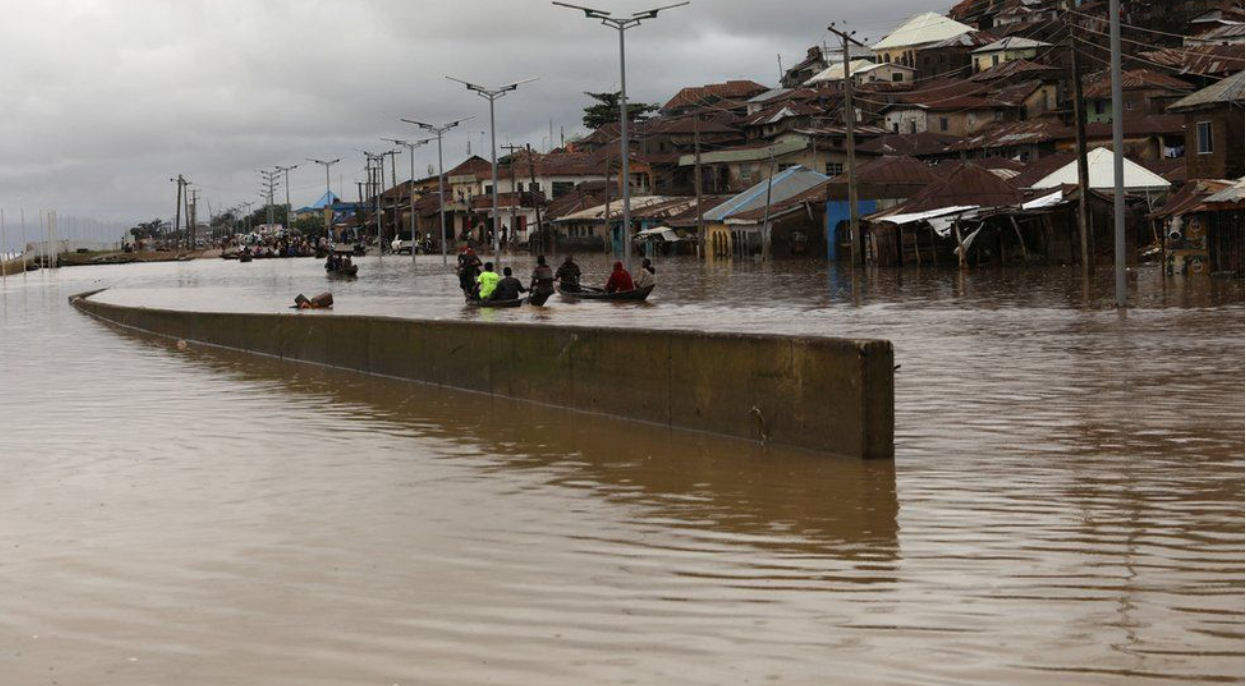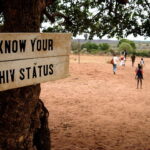Nothing made Abdullahi Kachako happier than the rainy season. Besides helping his small garden flourish, the rains brought a balmy relief from the blistering heat of March and April, making him sweat less.
“I am not a farmer, but I plant a few vegetables like spinach, bell peppers, and onions. It’s always very exciting for me to worry less about watering anything I plant when it’s the rainy season,” he said. “The rain is a blessing, but it has caused me more trouble recently.”
For a long time, Kachako had relished the fresh air that wafted from the river close to his home. Then came one evening in June 2024, when his long-cherished peace crumbled like a house of cards.
“This year’s flood is more intense. Just a few weeks ago, my family and I were inside our house on a Saturday evening. It was raining, and since we blocked the passage of water that affected us last year, we were all positive everything would be okay this year,” he explained.
That evening, Kachako and his family, like the rest of his community, slept through the torrential rain. However, when he woke up before dawn to pray, he discovered all his property in the living room was drenched from the rain, some irreparably damaged. He was heartbroken.
“I feel a bit unsafe here because it’s my property, and I cannot leave. Since this has happened, it means more could happen, and that’s not good,” he said in a shaky voice.
Musa Alkali, who hails from Yobe State, describes himself as a “regular customer” of flooding, which has devastated his home and farm.
“In 2023, my home was destroyed by flood, and the worst damage was to my farm. It has been difficult for me because I spent a lot on my farm, and everything was destroyed. I still haven’t recovered from this loss,” he narrated.
Having experienced flooding countless times, Akali has learnt to brace himself for more occurrences, which helps him to survive the frequent natural disasters. According to Alkali, the causes of the persistent flooding in his hometown are poor drainage and irregular geographical mapping.
Kachako’s and Alkali’s are a few examples of hundreds of Nigerians whose lives have been upended by flooding and other climatic disasters.
Flood and climate change
Experts maintain that flooding is directly and indirectly linked to climate change. Climate change results in more intense rainfall, which increases the chances of flooding. This could be traced to warm air, which holds moisture for a long period of time, leading to heavier rainfall and excessive flooding in certain regions. For every 1°C of warming, for instance, the atmosphere can hold 7% more moisture.
“Because of that increase in warmth, polar ice regions begin to melt into the oceans, and these oceans are connected to other parts of the world,” said Aliyu Sadiq, the co-founder of Eco-Cycle, an organisation that promotes climate action and the circular economy.
In addition to the volume of rainfall, soil moisture, infrastructure, and land use also contribute to flooding. As such, coastal cities like Lagos and Port Harcourt are more vulnerable to flooding owing to rising sea levels, which soon encroach on human property.
No stranger to flooding, Nigeria experienced perhaps its worst flooding in 2022, ravaging 33 states in the country. At least 600 people died, with more than 1.3 million people displaced. Agricultural production slumped, as thousands of hectares of farmland were deluged, leaving a huge toll on many Nigerian households.
Heavy rainfall, together with excess water released from the Lagdo Dam in Cameroon, was responsible for the floods, which caused extensive damage to the national economy. In the wake of the crisis, calls for improved disaster preparedness and infrastructure to mitigate the impact of future floods became more urgent.
Notwithstanding, flooding has reared its ugly head in 2024, portending another national crisis if not effectively managed. While significant expenditure has been spent on dredging the Niger and Benue rivers in order to allow for more water to pass through, Sadiq said that these efforts were not sustainable, since the water still flowed back into settlements.
Sadiq proposed proper urban planning as a holistic approach to tackling flooding in Nigeria.
“We have to invest in it. The government has to spend money on rehabilitation, relocation, and getting people out of flood-vulnerable zones. There’s also a need for improvement in flood research, flood early warning systems, and flood adaptation strategies,” he said.
Overall, Sadiq stressed the need for more dams to minimise the damage caused by the overflows.
Nothing made Abdullahi Kachako happier than the rainy season, which helped his garden flourish and provided relief from the heat. Although he enjoyed the rain for his small vegetable garden, recent flooding has caused significant trouble for his household. In June 2024, Kachako's home was severely affected by the intense flood, leaving his property damaged and making him feel unsafe.
Musa Alkali from Yobe State also faced severe flooding, which destroyed his home and farm in 2023. He attributes the persistent flooding to poor drainage and irregular geographical mapping. Both men's experiences highlight the broader issue of flooding affecting hundreds of Nigerians.
Experts link flooding directly and indirectly to climate change. Warmer air holds more moisture, leading to heavier rainfall and increased flooding. Additionally, melting polar ice contributes to rising sea levels, affecting coastal cities like Lagos and Port Harcourt.
Nigeria experienced severe flooding in 2022, which impacted 33 states, displaced over 1.3 million people, and caused significant agricultural losses. The release of excess water from the Lagdo Dam in Cameroon exacerbated the situation. Calls for improved disaster preparedness and infrastructure have become more urgent.
In 2024, inadequate efforts at dredging rivers have proven unsustainable. Aliyu Sadiq, co-founder of Eco-Cycle, suggests proper urban planning, investment in rehabilitation and relocation, and enhanced flood research and warning systems as holistic solutions. More dams are also needed to manage water overflows.






